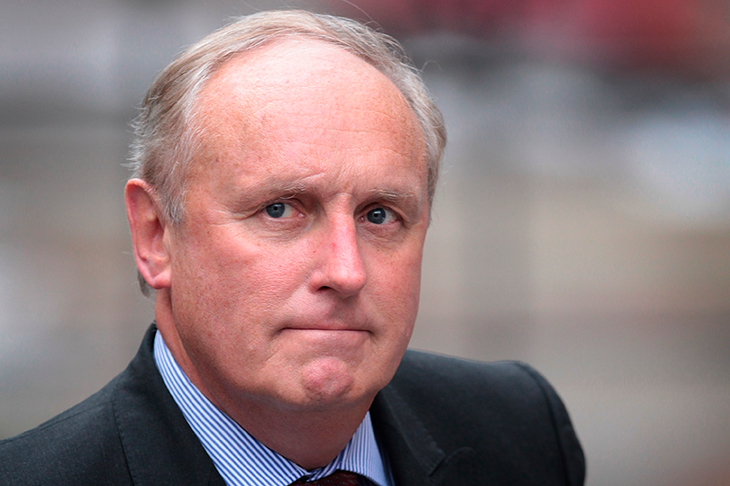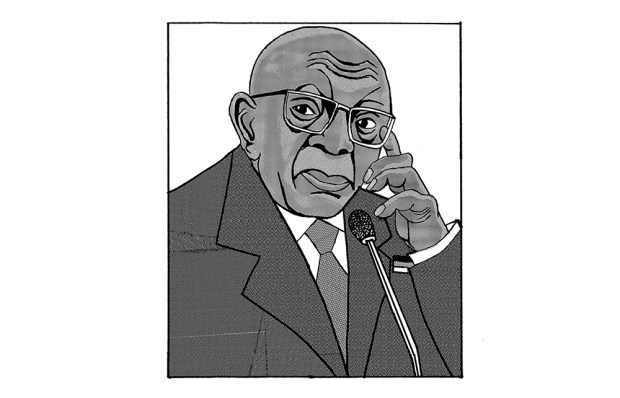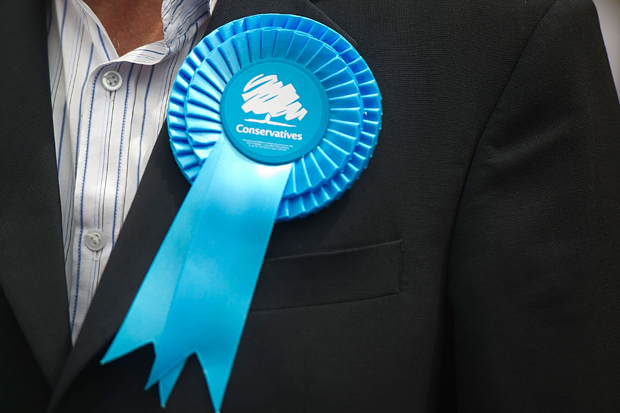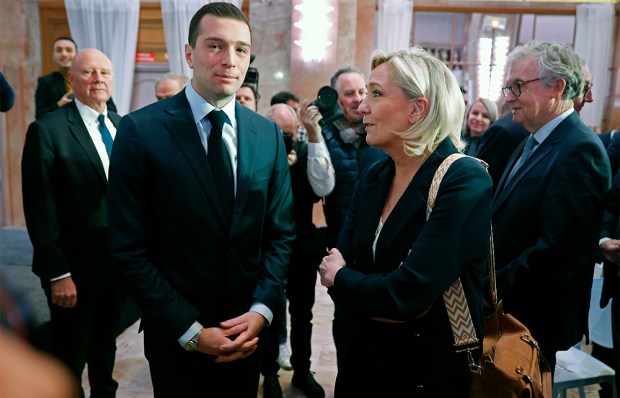A beautiful noise rang out last week in the wake of the news that the government is considering Charles Moore to become the new chairman of the BBC and Paul Dacre to be the head of the broadcasting watchdog Ofcom. The noise was the sound of the British left wailing that toys they thought were theirs alone might now (under a Conservative government) finally go to identifiable conservatives.
The former editor of the GuardianAlan Rusbridger shrieked that ‘this is what an oligarchy looks like’. This and similar tweets were presumably sent from the lodgings of the Oxford college that Rusbridger was made principal of five years ago. Others who screamed themselves sick included BBC employees who briefed that Moore’s appointment ‘would shatter morale. People will leave.’ For there can be no greater way to refute accusations of institutional leftism in the BBC than for the corporation’s employees to threaten to resign en masse in response to a conservative appointment. Elsewhere, Have I Got News For Youtweeted that this would be the end for the BBC. Which is as funny a joke as that show has mustered in the present century.
Of course, there is no certainty Moore or Dacre will take up either job. And even less certainty that if they do so they will be able to turn around the relevant organisations. But the announcements are a good sign because they suggest that the Conservatives might finally be showing some fight in the culture and institutional wars that conservatives have traditionally lost.
It is a surprise. For after all, a year into office there had been very few indications that the Johnson government would be any more stalwart in appointing conservatives than its two predecessors.
David Cameron’s government managed to see William Shawcross appointed as the chair of the Charity Commission and Andrew Roberts as a trustee of the National Portrait Gallery. Theresa May fared less well. The attempt to put Toby Young on to a higher-education quango ground British politics to a near standstill until Young withdrew his candidacy. The same government’s efforts to put Roger Scruton into an unpaid role heading an advisory commission on buildings led to even greater pain. In recent years some of us had given up on the idea that the Conservatives could appoint any conservatives into positions in public life.
As such, the Moore and Dacre appointments would be a much-needed volley — one that would demonstrate that the culture wars can no longer be fought and won solely by the radical left. In the wider country there are signs of exasperation over how one-sided the cultural battle has been. Last weekend the actor Laurence Fox announced the setting-up of a new political party — Reclaim — to push back against the left’s stranglehold over every cultural and other institution in this country. Though it is unlikely to pose much electoral threat to the Conservatives, it could help remind them that assaults on our history and culture are not viewed with defeatism or equanimity by all of the British public.
Still, the question is not whether Dacre and Moore can be appointed, but what support they might get and what other phalanxes might be brought in behind them. How, in short, to ensure that they are not one-offs but part of a concerted march back through the institutions. There is plenty to do.
For noble though it is to focus on the BBC, huge amounts of the cultural and political weather in this country are set not by the BBC but by the people whom they report on and go to. In quango after quango it is the same old story. The Victims’ Commissioner, Vera Baird, for instance, is a former Labour MP whose every statement and action fits the old Blairite agenda. Yet it was the Conservative government that appointed her to her current position in June 2019.
But it isn’t just about individuals. It is about the cultural attitude currently embedded at the roots of the civil service and every government appointment. When the Blair government instituted the ‘diversity’ agenda the Conservatives went along with it. Cameroon Conservatives saw it not as a right or left issue but simply a forwards or backwards issue: a progressive versus regressive one. That thought-rot now runs deeper than almost any other aspiration in the civil service. Indeed when permanent secretaries write their objectives for their roles, the one thing they all have in common — far above the wellbeing of the country — is the promotion of the ‘diversity agenda’.
There are some signs that the chessboard is being rearranged. The dismissal of Jonathan Slater from his position as permanent secretary at the Department of Education was one good sign. Slater was, and still is, one of the great twitterers about diversity. But it is not enough just to change the figures on the board. It is necessary to change the game. Slater may have gone, but his former colleagues still find themselves in the midst of a pandemic and looming depression being sent on ‘diversity training’ and racial bias awareness training, as though these gods sit above all others as the goal and indeed purpose of the British state.
And then there is the issue of the ‘pilgrims’ — publicly funded workers who, though paid for by the taxpayer, double up as union officers and organisers. Like so much else, the Cameron government ducked dealing with this scandalous arrangement. But if the Johnson administration wants not just to save money but to demonstrate a real change in the wind, it would sweep all these people off the public pay roll.
The last Labour government rigged almost every institution in this country with enormous craft and cunning. Even now, from the National Lottery Fund to the National Trust, we have institution after institution in this country run by people whose interests are opposed to those of the general public, and aspiring more than anything else to the hideous, divisive and now clearly failing ‘woke’ agenda. Dacre and Moore are good early warning shots. But if the Johnson government wants to do something meaningful, it should not just follow through on their appointments; it should follow them up with a fusillade every bit as relentless and long-lasting as the Labour one, the repercussions of which this country still suffers from.
Got something to add? Join the discussion and comment below.
Get 10 issues for just $10
Subscribe to The Spectator Australia today for the next 10 magazine issues, plus full online access, for just $10.
You might disagree with half of it, but you’ll enjoy reading all of it. Try your first month for free, then just $2 a week for the remainder of your first year.















Comments
Don't miss out
Join the conversation with other Spectator Australia readers. Subscribe to leave a comment.
SUBSCRIBEAlready a subscriber? Log in